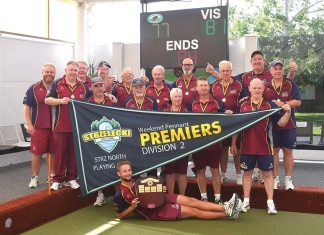PHILIP HOPKINS
By PHILIP HOPKINS
BY the end of next week, Latrobe Valley Express reporter Michelle Slater will have hit a milestone: she will have seen 73 concerts by Midnight Oil.
Her already imposing 71 concerts will have been added to by the Aussie rock band’s final two gigs – the first in Canberra and the second at the Hordern Pavilion in Sydney, which
signals the end of the band’s touring career.
As nearly always, she will be in the front row.
“I have been following the band for over 32 years, all around Australia,” she said, with Darwin the furtherest destination she has travelled to.
“I fell in love with the band at high school in the mid-80s. It was due to a combination of musicianship and politics. It was rare to find music with a politically relevant message.”
For Michelle, the songs matched the discussions around the family dinner table.
“The Oils responded to a broad range of issues – the Cold War, media ownership, and
brought Indigenous issues to the mainstream spotlight,” she said.
Politics was always a part of growing up.
Her father was a refugee from Romania, her mother is from France. They met in France
after her father escaped from Romania via Italy.
Her father’s Romania experience under communism made him conservative politically.
“Midnight Oil made politics accessible to me as a young person,” she said.
Her commitment to the Oils went up a notch in the 1990s – her university days when she
was driving an old bomb of a Holden Camira.
One summer, she saved up her AusStudy grants, got into her ‘bomb’ and followed the band all around Australia, getting to know the members personally.
“The band went out of their way to make sure I was fed and had accommodation,” she said.
It was a bit of a shock when the radical activist and band leader Peter Garrett decided to leave the world of protest music for politics, becoming a member of a federal Labor government.
“I was disappointed that Garrett went into politics. I was disappointed that an anti-nuclear warrior could be part of a party and government that approved a new uranium mine in South Australia,” she said.
“I wrote a letter to him expressing my disappointment. Garrett made a hard decision; it
was better to be inside the tent than screaming from the sidelines.”
Michelle acknowledged that Garrett did enter politics at a difficult time, during the period of Prime Ministers Rudd and Gillard.
“He faced a lot of challenges, and was thrown under the bus over the pink batts affair,” she
said. When the band decided five years ago that it would reunite, Michelle took it with a grain of salt. “I was not sure of how I would react on the back of Garrett’s political career,”
she said.
There had been no abrupt abandonment of the band, however; during Garrett’s political phase, she maintained contact with the other band members.
Michelle sees a lot of live music – in Melbourne’s pubs in the independent underground scene, “which I’m very excited about”.
“Midnight Oil remains the most powerful live band I’ve ever seen. I’ve never seen a bad Oils gig,” she said. “Midnight Oil was the first live band I ever saw – that was Year 11 at school.”
Looking at the Oils’ near 50-year career, Michelle has always loved their musicianship, viewing their career as a collection of albums (all 16 of them) and eras, from post-punk to
more acoustic and hollowed-bodied guitar sound of their later career.
Peter Garrett is now 70, and the band members are well into their 60s, but they will not stop playing live, just ending their touring career.
They could still do one-off concerts, for example, on a pressing issue.
Michelle recently saw their last two gigs at the Palais Theatre in St Kilda – their ‘swan song” for Melbourne. These were two two-and-a-half hour concerts, shows that spanned their career.
“That took a lot out of them physically. Garrett’s voice – there are no more savage screams, and he doesn’t move the way he used to, but as a collection of musicians, they are still a force to be reckoned with.”
And those front row seats, where she has been for most of the Oil gigs? “Front row – it’s like being in front of a jumbo jet about to take off,” she said, “sandwiched between two of Australia’s most powerful and innovative guitarists.”
Michelle really enjoyed the latest album, which was savage on Australia’s lack of action on climate change, coupled with brutal guitar playing. “Some of it is quite cynical. Midnight Oil had never been cynical in their albums; there is always talk of hope, but this new album says ‘it’s too late to act’.
Michelle feels the band made the right decision to quit touring, considering their age.
“What they have given me is more than I could have asked for. I’m sad at their farewell, but they have left something to value and cherish,” she said.
“It was an opportunity to say goodbye, a ‘thank you” to all they have given me and the
Australian cultural landscape, supporting the band but also the arts industry and the whole industry that supports the Oils – sound engineers, suppliers and light crew, particularly important in the post-COVID time.”
Just for the record, her mother liked the Oils.
She met them and approved of them.
“Nice young boys, not into drugs. And (drummer) Rob Hirst speaks French.”












